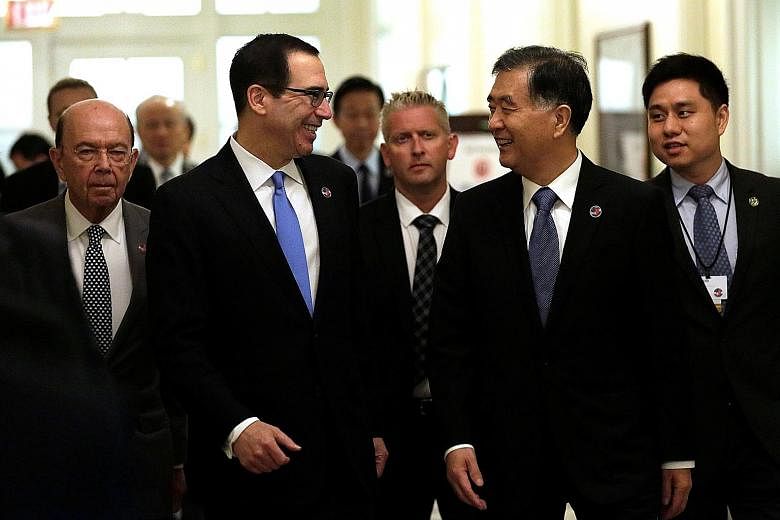WASHINGTON • The US yesterday launched its first round of trade talks with China since Mr Donald Trump took office - in an unusually blunt manner, demanding a more "fair, equitable and reciprocal" relationship, with more access for American-made goods and services.
Noting the more than 200 per cent surge in Chinese exports to the United States in the last 15 years, creating a trade deficit of US$309 billion (S$423 billion) last year, Commerce Secretary Wilbur Ross insisted change was necessary.
"If this were just the natural product of free market forces, we could understand it, but it's not," he said at the opening ceremony of the one-day meeting between the world's top two economies.
"So it is time to rebalance our trade and investment relationship in a more fair, equitable and reciprocal manner."
The talks are a continuation of the process undertaken by the previous two administrations, which the Trump administration has rebranded as the US-China Comprehensive Economic Dialogue.
Treasury Secretary Steven Mnuchin said the talks with the Chinese delegation led by Vice-Premier Wang Yang would focus on concrete steps to provide greater access and a "level playing field" for US companies to the world's second-largest market.
"We need to work together to maximise the benefit for both sides. But this is only possible if there is a more fair and balanced economic relationship between the US and China," Mr Mnuchin said.
"It means addressing the imbalances caused by the Chinese intervention in its economy," he said, adding: "A more balanced economic relationship will create prosperity for our two countries and the world."
During his campaign, Mr Trump attacked China for unfair trade practices, but his meeting with Chinese President Xi Jinping at his Florida resort in April prompted a change of rhetoric and the launch of a 100-day economic cooperation plan. That led to specific but narrow achievements, including opening the Chinese market to US beef exports, and pledges to remove barriers to US credit card transactions, credit ratings and other financial services, including bond underwriting, that were to be concluded prior to yesterday's talks.
Mr Wang said the key point about the meeting was that the two countries were "having dialogue, not confrontation". "We don't need to defeat each other in handling differences," he cautioned, stressing that "confrontation will immediately damage the interests of both" countries.
Mr Wang quoted a passage from Mr Trump's 2009 business advice book, Think Like A Champion - which in turn was quoting industry pioneer Henry Ford - saying: "Coming together is a beginning; keeping together is progress; working together is success."
"China is ready to work together," he said.
Speaking at a US-China business luncheon on Tuesday, Mr Wang had noted that business cooperation is about the give and take of interests, and it was only natural that differences may arise from time to time.
"There are people both in the Chinese and American business communities who want their own government to dismantle the 'barriers' of the other side that block market access, and at the same time build 'walls' to keep foreign goods out," he said.
"We understand that quite a few Americans support 'Buy American, Hire American', just as in China there is also a voice for 'Buy Chinese, Hire Chinese'. But it is important that both sides come to realise with cool heads that, given the depth of our business cooperation, neither Chinese nor Americans can do without goods from the other country," said Mr Wang.
He pointed out that there was huge market potential for US exports of advanced technologies, key equipment and critical parts to China, but American businesses were unable to have their fair share of "cake" due to US export controls.
He indicated that if the US liberalised its export barriers to China to the same level as Brazil or France, the trade deficit would narrow by up to 24 per cent and 34 per cent respectively.
AGENCE FRANCE-PRESSE, XINHUA


